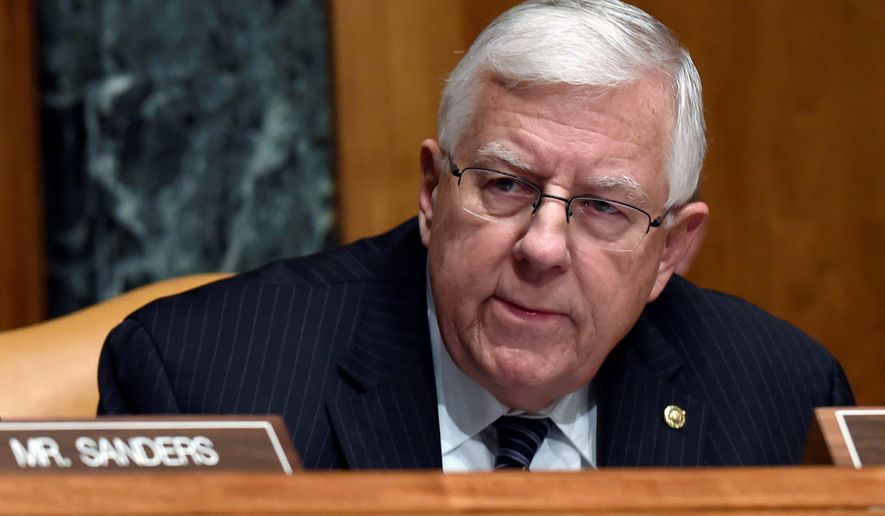The Senate GOP’s new budget pushes Obamacare repeal to the sidelines in its drive for sweeping tax cuts, meaning President Trump won’t get another clear shot at repealing the health-care law until late winter or spring.
Under the proposal released Friday, Republicans could still target President Obama’s “individual mandate” to hold insurance or other tax provisions within his signature health care law.
Yet the blueprint by Senate Budget Committee Chairman Mike Enzi was crafted with comprehensive tax reform in mind, leaving Mr. Trump to grapple with an ailing Obamacare marketplace before signups begin anew in the fall.
Saturday was the final day that Mr. Trump and his Senate GOP allies could leverage their 2017 budget to replace Obamacare with block-grant legislation that would have let the states shape their own health markets, while avoiding a Democratic filibuster under a process known as “budget reconciliation.”
Some Republicans wanted to restart the effort immediately under the new year’s blueprint.
Budget-writers ignored that idea in the instructions they released Friday, giving the Senate Finance Committee to task of crafting a tax proposal that can pass with at least 50 GOP votes in the Senate.
They didn’t instruct the Senate Health Committee, which oversees health insurance, to craft new legislation, underscoring the decision to shelve the repeal push and pivot to taxes.
Republicans say they will write yet another reconciliation bill — for fiscal 2019 — that lets them scrap the Affordable Care Act on GOP votes alone. That budget will be due by mid-April, pushing the thorny debate into mid-term campaign season.
In the meantime, bipartisan leaders of the Senate Health Committee said they are “making good progress” on a bill to stabilize an Obamacare market reeling from rising rates and dwindling choices.
They’re settling the terms of an agreement to fund contested Obamacare payments that reimburse insurers who lose money on low-income customers. In exchange, states would get more control over their state markets.
Sen. Ted Cruz, Texas Republican, appeared to undercut their progress Friday by saying he opposes any “bailout” of insurers and that Republicans should be focused on the next stab at repeal.
“The American people did not send us here to bail out insurance companies,” said Mr. Cruz, who faces re-election next year. “They sent us here to repeal and replace Obamacare. Failure is not an option.”
His comments reflect similar opposition from House conservatives, underscoring the tall order facing Sen. Lamar Alexander, Tennessee Republican, and Sen. Patty Murray, Washington Democrats, as they try to tamp down premiums for nearly 20 million Americans who buy their own insurance, both on and off Obamacare’s web-based exchanges.
In the meantime, Mr. Trump is testing the boundaries of what he can do to reshape the law and reel in its promotion, from slashing enrollment outreach to watering down enforcement of its “individual mandate” requiring Americans to hold insurance or pay a tax.
He also said he will release an executive order this week that lets consumers band together in associations to purchase insurance across state lines, though hasn’t provided details of how it would work.
Democrats are worried that Obamacare consumers will suffer from Mr. Trump’s ambivalence toward his predecessor’s signature domestic achievement.
House Democrats demanded to know Friday why his administration plans “major outages” of the federal Obamacare website during open enrollment this fall.
The administration plans to shut down HealthCare.gov for 12 hours of maintenance on five out of six Sundays during the open enrollment period from Nov. 1 to mid-December. It’s also scheduled an overnight outage following the first day of signups on the website, which is used by more than three dozen states.
Rep. Elijah Cummings of Maryland, the top Democratic investigator on the House Oversight Committee, said Mr. Trump already cut open enrollment period in half, so the Health and Human Services Department should justify the decision to slash web-shopping time.
“It is unclear why the Trump administration needs so many more outages to maintain the site this year — after the enrollment period was shortened — and why the administration designated the first day of open enrollment season to conduct purportedly regular, non-urgent maintenance,” Mr. Cummings wrote to then-HHS secretary Tom Price, who resigned late Friday.
The administration says maintenance outages are routine, though former Obama administration officials have questioned the duration of the upcoming shutdowns, saying they exceed the norm.
• Tom Howell Jr. can be reached at thowell@washingtontimes.com.




Please read our comment policy before commenting.